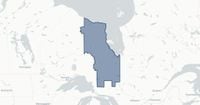In a significant political shift, Conservative Gaétan Malette has emerged victorious in the newly established riding of Kapuskasing-Timmins-Mushkegowuk, capturing nearly 50 percent of the vote during the federal election held on April 29, 2025.
With 205 out of 206 polls reporting, Malette secured 22,894 votes, translating to 49.06 percent of the total ballots cast. Liberal candidate Steve Black followed with 18,120 votes, or 38.83 percent, while Nicole Fortier-Levesque of the New Democratic Party (NDP) came in third with 4,816 votes, representing 10.32 percent of the tally.
Malette expressed his relief and pride after the victory, stating, "I've been working at this for a year and a half. I'm proud of the work from my team and I'm glad to have support from the voters." He emphasized the importance of community support, noting that it took an "army of volunteers" to campaign effectively in such a vast riding.
The riding of Kapuskasing-Timmins-Mushkegowuk is an expanded version of the former Timmins-James Bay, incorporating areas such as Hearst, Chapleau, and other communities previously part of Algoma-Manitoulin-Kapuskasing. This change came about due to updated electoral boundaries ahead of the 2025 federal election.
As the results were tallied, the atmosphere at the Dante Club was charged with anticipation. Early returns had favored Black, but as the night progressed, Malette's lead grew, culminating in Black conceding around 11:30 p.m. on election night. Malette noted, "The celebration is over and now I need to prepare to work," highlighting his commitment to addressing the pressing cost of living crisis facing Canadians.
Malette's victory is particularly notable as it marks a shift in representation for the riding, which has been held by NDP stalwart Charlie Angus since 2004. Angus, who decided not to run in this election, has been a prominent figure in the House of Commons, and his absence has opened the door for new leadership.
Malette's campaign was characterized by a strong focus on affordability, a theme he reiterated during his victory speech. "That’s what we’ll have to work on as a government," he asserted, acknowledging the diverse challenges faced by the various communities within his riding. His approach will be to tackle these issues one at a time, with the cost of living taking precedence.
Despite the challenges posed by the size of his riding, Malette feels prepared to represent all constituents. He remarked, "I will now represent every citizen in the riding," indicating his readiness to engage with the unique needs of each community.
As of early morning on April 29, the broader electoral landscape was shaping up with the Liberals projected to form a minority government, having been elected in 146 ridings. The Conservatives, with Malette's win, secured 142 ridings. The Bloc Québécois and New Democrats have also made gains, with the former winning 22 seats and the latter five.
Malette's election comes at a time when the Canadian political landscape is evolving, with the House of Commons expanding by five ridings due to population growth. This election marks a pivotal moment not just for Malette, but for the constituents of Kapuskasing-Timmins-Mushkegowuk, who will now look to their new representative to address their concerns and advocate for their needs in Parliament.
Reflecting on his campaign journey, Malette credited his success to the collective effort of his supporters, saying, "It’s everyone here who has won this. It took an army of volunteers. That’s the only way we were able to do it." With a strong mandate from the voters, Malette is now poised to take on the challenges ahead and work towards improving the lives of those in his riding.
As the dust settles on this election, the focus will shift to how Malette and his fellow MPs will navigate the complexities of governance in a divided Parliament, and how they will address the pressing issues that Canadians care about most.




